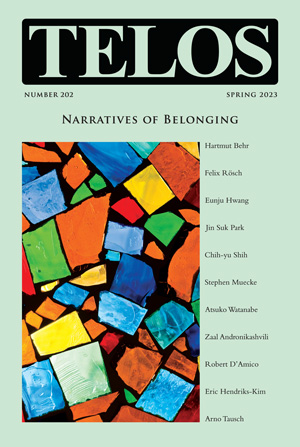In today’s episode of the Telos Press Podcast, David Pan talks with John Milbank about his article “A Tale of Two Monsters and Four Elements: Variations of Carl Schmitt and the Current Global Crisis,” from Telos 201 (Winter 2022). An excerpt of the article appears here. In their conversation they discuss the three idioms into which Milbank divides Carl Schmitt’s thought; why they should be seen as separate idioms rather than different aspects of a single perspective; the extent of overlap between the idioms; whether the decisionist Schmitt is as arbitrary as he is made out to be; the characteristics of a medieval European conception of nomos that Schmitt wishes to retrieve; the similarities between Schmitt’s third idiom of global regions and both Nazism and Russian theorists like Gumilev, Panarin, and Dugin; Schmitt’s decisionism, basic values, identity, and thinking through popular sovereignty. If your university has an online subscription to Telos, you can read the full article at the Telos Online website. For non-subscribers, learn how your university can begin a subscription to Telos at our library recommendation page. Print copies of Telos 201 are available for purchase in our online store.
|
In today’s episode of the Telos Press Podcast, David Pan talks with Paul Grenier about his article “Konstantin Krylov’s Ethical Theory and What It Reveals about the Propensity for Conflict between Russia and the West,” from Telos 201 (Winter 2022). An excerpt of the article appears here. In their conversation they discuss Russian conservative thinkers, including Konstantin Krylov, Vadim Tsymburski, and Vladimir Solovyov, and their attitudes toward the West; how Krylov differentiates between different civilizational types as well as how he differentiates between liberalism and Russian civilization; how Krylov frames his critique of liberalism and of Russian civilization; how his view of liberalism compares with other definitions; how else we can interpret the weaknesses of liberalism, aside from Krylov’s view of a good and bad version; the relationship between liberalism and tradition; and what Krylov’s thought tells us about the development of Russian perspectives on its relationship to the West today. If your university has an online subscription to Telos, you can read the full article at the Telos Online website. For non-subscribers, learn how your university can begin a subscription to Telos at our library recommendation page. Print copies of Telos 201 are available for purchase in our online store. Telos 202 (Spring 2023): Narratives of Belonging is now available for purchase in our store. Individual subscriptions to Telos are also available in both print and online formats. Online subscribers have access to the full issue at the Telos Online website. The following is an excerpt from the issue’s introduction by Hartmut Behr and Felix Rösch, who are the issue’s guest editors. Introduction: Narratives of Belonging—The Interrelation between Ontological-Epistemological Observations and Narrative MethodologyHartmut Behr and Felix Rösch 1. Introduction
In today’s episode of the Telos Press Podcast, David Pan talks with Miles Yu about his article “Escape from Civilization’s Predicaments,” from Telos 201 (Winter 2022). An excerpt of the article appears here. In their conversation they discuss the main problems with using the idea of civilization as a way of understanding today’s geopolitical conflicts; the meaning of ideology and its effect on politics; why it is more important to think of ideology than of civilization as a way of understanding politics; how the inability of Americans to see the importance of ideology in the world has affected U.S. foreign policy; what kind of foreign policy would emerge out of the focus on ideology; why Marxism as an ideology has maintained its appeal both for countries such as China and for U.S. intellectuals; and what strategies the United States has in this ideological conflict. If your university has an online subscription to Telos, you can read the full article at the Telos Online website. For non-subscribers, learn how your university can begin a subscription to Telos at our library recommendation page. Print copies of Telos 201 are available for purchase in our online store. In today’s episode of the Telos Press Podcast, David Pan talks with David A. Westbrook about his article “From the Ivory Tower to the Football Stadium: A Rueful Response to Michael Hüther,” from Telos 200 (Fall 2022). An excerpt of the article appears here. In their conversation they discuss Michael Hüther’s claim that the decline of truth at the university is due to moralization and economization; the traditional conception of the university that forms the background for Hüther’s critique and the function it played in society; how the role and function of the university today is different from that earlier conception and the reasons for this shift; how has university research moved from being a form of science to a form of investment; the political function of the university today; whether the ideals of merit and inclusion contradict each other; and how the university compares to a church. If your university has an online subscription to Telos, you can read the full article at the Telos Online website. For non-subscribers, learn how your university can begin a subscription to Telos at our library recommendation page. Print copies of Telos 200 are available for purchase in our online store. |
||||
|
Telos Press Publishing · PO Box 811 · Candor, NY 13743 · Phone: 212-228-6479 Privacy Policy · Data Protection Copyright © 2024 Telos Press Publishing · All Rights Reserved |
||||








